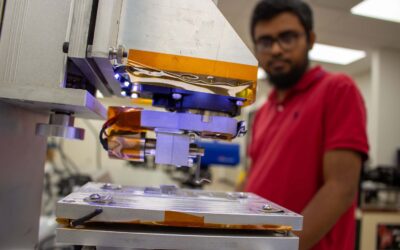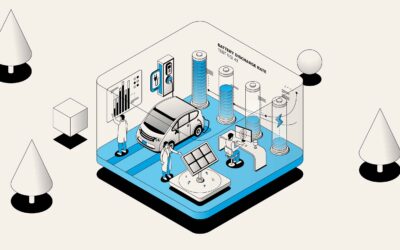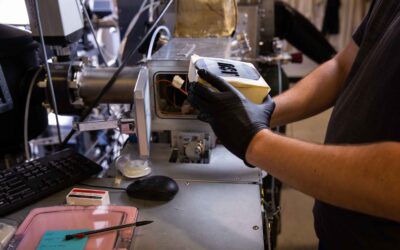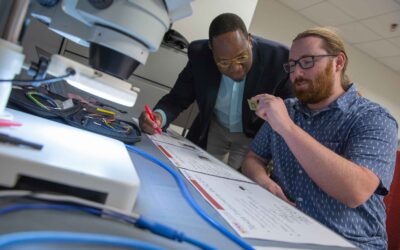Domestic manufacturing efforts strengthened by new ASU school
By Sona Srinarayana
November 9, 2022
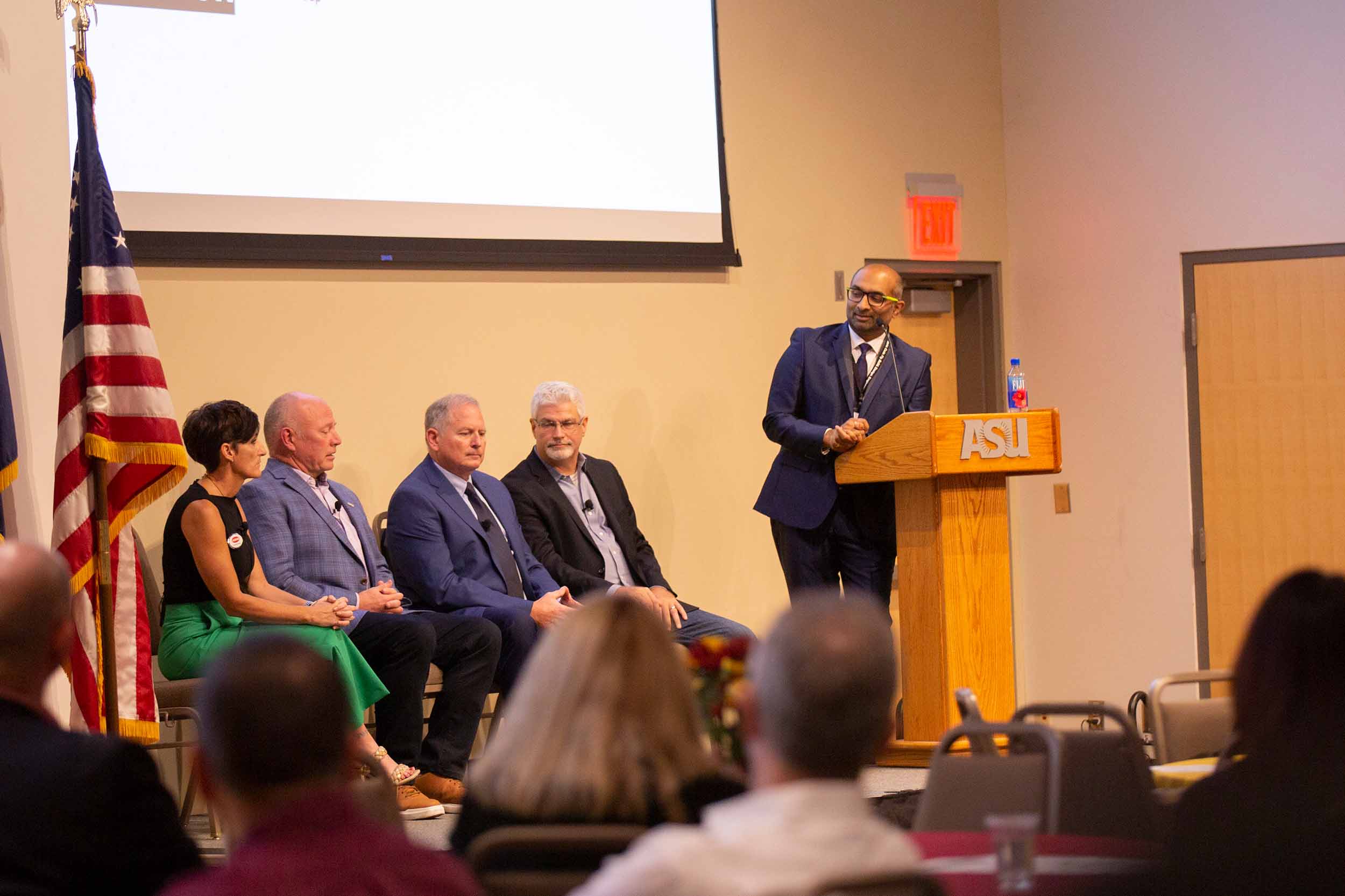
This October, nearly 200 industry members and Arizona State University affiliates officially celebrated the launch of the highly anticipated School of Manufacturing Systems and Networks at ASU’s Polytechnic campus. The seventh and newest school in the Ira A. Fulton Schools of Engineering at ASU is poised to lead the university’s vision of revitalizing manufacturing to meet semiconductor and other technology demands in Arizona and beyond.
The open house event brought together manufacturing thought leaders and executives from key industries from across the country to discuss the historical impacts of manufacturing in the U.S., global manufacturing competitiveness and how academia and industry can work together to amplify manufacturing research and produce the versatile manufacturing engineers of tomorrow.
In addition to celebrating the launch of the School of Manufacturing Systems and Networks, Binil Starly, the school’s inaugural director, says he intentionally brought together decision-makers from academia and industry to offer a platform for meaningful dialogue to take place to move the needle forward.
During his discussions, Starly provided a window into the future research foci of the School of Manufacturing Systems and Networks, a three-year forecast for academic programming and new infrastructure that will support the school’s flourishing needs. He also outlined his visions for research and technology development in microelectronics manufacturing, space manufacturing and biomanufacturing.
“With our industrial partners, each of these areas represents significant opportunities for infrastructure development, research advancement and workforce development programs,” Starly said.
He also pointed out the significance of the New Economy Initiative and its part in driving manufacturing advances in the state of Arizona and specifically within the school through the MADE Science and Technology Center.
“From areas such as advanced materials processing, industrial automation and digital or cyber engineering in manufacturing, our faculty are jointly working with companies in Arizona to help accelerate the translation of new manufacturing technologies into factories,” he said.
Kyle Squires, ASU’s vice provost of engineering, computing and technology and dean of the Fulton Schools, emphasized that “the future of manufacturing will continue to be shaped by rapidly evolving technologies, globalized networks, complex supply chains and human-in-the-loop models.”
He reinforced the importance of collaboration and the integral role ASU’s stakeholders and partners will play in the success of the School of Manufacturing Systems and Networks.
“There’s a reason that ASU has been No. 1 in innovation for eight years,” Squires said. “We thrive on and anticipate opportunities to make an impact. The combination of student attainment, faculty research and industry partnership has allowed us to become a force within the Phoenix metropolitan area, the state and the nation. Through our strategic efforts with partners in the community, government and industry, the Fulton Schools is on course to become the nation’s largest producer of engineering technical talent.”
The theme of collaboration echoed throughout the event, including in remarks from Ann McKenna, vice dean of strategic advancement for the Fulton Schools.
McKenna offered insights into the history of manufacturing at the Fulton Schools. She also leaned into the “applied, human-centered and industry-connected” nature of the ASU Polytechnic campus and the “powerful combination of expertise” that has the potential to stem from integrating the campus’s degrees and concentrations.
Following McKenna’s discussion was a keynote address by John Dyck, the CEO of the Clean Energy Manufacturing Institute, or CESMII. He focused on smart manufacturing democratization — the “frictionless movement of information, data and context between real-time operations and the people and systems that can create value for an organization” — and how this concept, involving coordination between academia and industry, is critical in securing global leadership in advanced manufacturing.
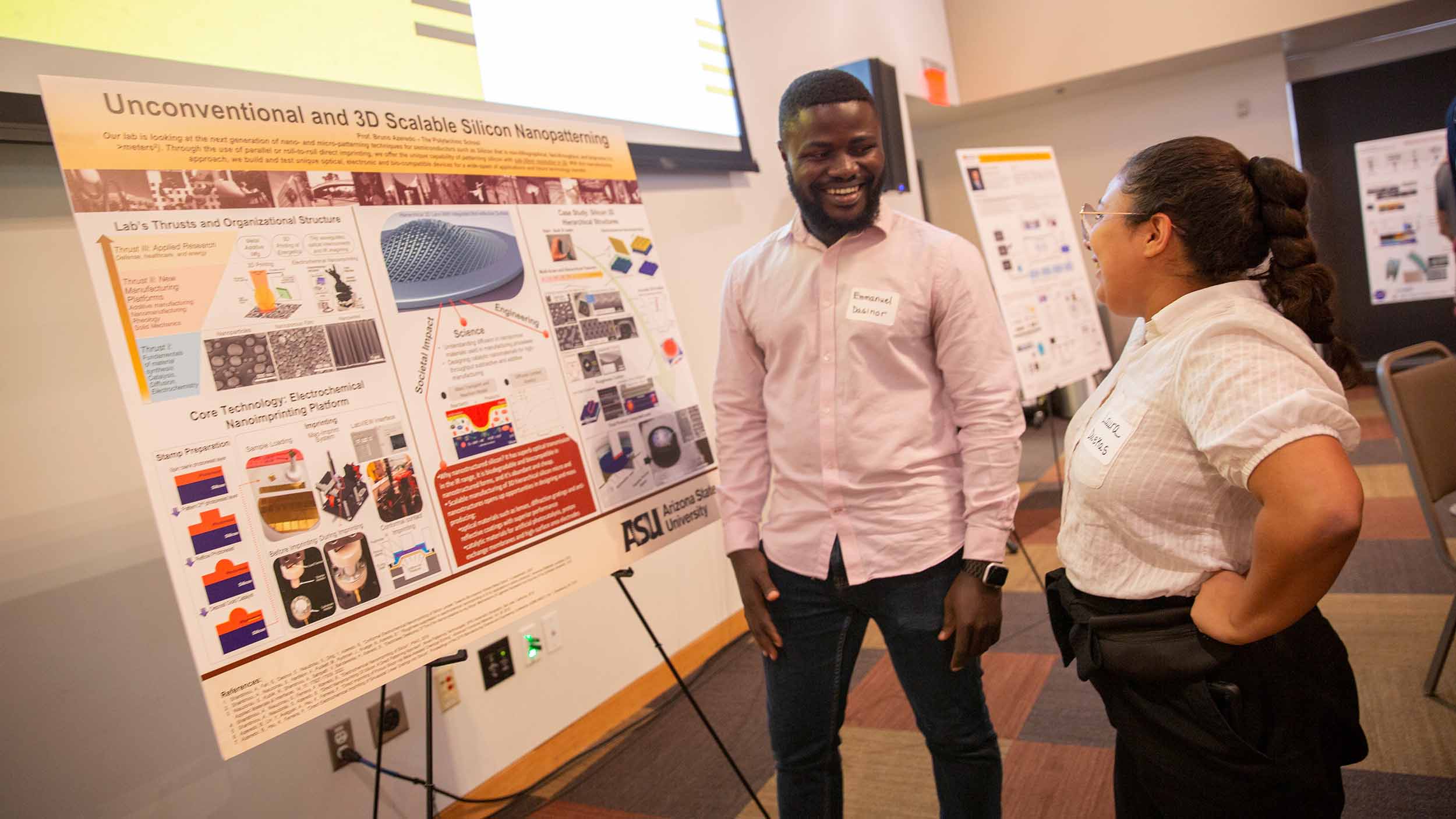
Mechanical engineering Graduate Research Associates Emmanuel Dasinor (left) and Laura Duenas Gonzalez (right) presented their project during the student poster viewing at the School of Manufacturing Systems and Networks open house event at the ASU Polytechnic campus. Photographer: Erika Gronek/ASU
To draw even more attention to these concepts, Starly moderated two industry panels, “Technology and the Organization” and “Technology and the Human Worker,” featuring key industry leaders. He asked questions pertaining to the automation of factories, areas of opportunity in academia, the workforce of the future, impacts of the CHIPS and Science Act and how to attract students to manufacturing pathways, among other topics.
Panelist Jon Hobgood, the vice president of advanced manufacturing and automation for Honeywell Inc., was also in attendance. Local manufacturer Honeywell Aerospace is a global leader in the aviation industry with a strong commitment to operational efficiency, safety and innovation.
Since 2014, Honeywell Aerospace has invested annually in student-led capstone projects, capital equipment, sponsored research and curriculum at the Fulton Schools. The strategic partnership with ASU enables the company to recruit students into their facilities, which leads to “business success, rewarding careers for students and development of innovative processes and technologies to solve real, complex problems,” Hobgood said.
This year, Honeywell Aerospace entered into a multi-year plan with ASU investing in philanthropic student engagement, directed research and capital equipment that ties to their strategic plan to develop a robust engineering recruitment pipeline.
“Many have seen over the last few years how important it is for companies to manage a resilient supply chain and have the ‘know how’ to design and manufacture high-technology products,” Hobgood said. “It is an appropriate time for leading schools like ASU to help invest in areas that will help students be effective leaders in solving these exciting challenges.”
Audrey St. Onge, president and CEO at Lallemand’s North American Baking business, a member of the AZNext advisory board and a panelist at the open house event said, “I attend many industry events and at the School of Manufacturing Systems and Networks Open House there was deep listening and passion for wanting to move the industry forward.”
Lallemand Baking, a company specializing in microorganisms for various applications such as baking, currently sponsors various e-Projects, or engineering projects, at The Polytechnic School, part of the Fulton Schools. The company recently hired a student to develop an e-Project into a real manufacturing solution.
Panelist Paul Aiello, executive director of the Certifications Education Group at FANUC America, spoke about the role of humans in autonomous factories. He said he was “excited to hear the level of engagement that ASU has with industry and the value ASU places on listening to the talent needs of industry.”
FANUC America is a leader in advanced automation, including robotics, CNC and automation technology, with a growing footprint in the Southwestern U.S.
“Our local customer base is struggling to find skilled talent at every level,” Aiello said. “So we look forward to aligning industry and education by working with ASU to build a Center of Excellence at ASU’s Polytechnic campus to prepare the next generation of manufacturing talent.”
Although only a three-hour event, the open house was jampacked with substantive discussions and, most importantly, served as a catalyst to a large-scale manufacturing movement that’s taking place at ASU and in the local manufacturing industry.
Starly concluded the event by expressing his gratitude to the attendees and excitement for the future, emphasizing that “the School of Manufacturing Systems and Networks aspires to be a world leader in advanced manufacturing, producing graduates at all levels to help strengthen U.S. manufacturing.”
Fulton
Researchers
Binil Starly
School Director and Professor
School of Manufacturing Systems and Networks
Kyle Squires
Senior Vice Provost for Engineering, Computing and Technology
Arizona State University
Dean and Professor
Ira A. Fulton Schools of Engineering
Ann McKenna
Vice Dean of Strategic Advancement and Professor
Ira A. Fulton Schools of Engineering
Related Stories
MADE at ASU
The Manufacturing, Automation and Data Engineering Science and Technology Center launches two projects focused on optimizing additive manufacturing and AI software development
ASU Proposers Day invites industry leaders to collaborate on state issues
ASU Proposers Day invites industry leaders to collaborate on state issues By Mary Beth FallerOctober 27, 2022This story originally appeared in ASU News.s part of the state's effort to invest in the New Economy Initiative, to strengthen Arizona’s...
ASU facilities provide opportunities for businesses to scale research
Arizona State University’s Core Research Facilities offer state-of-the-art equipment available for public use
Moving microelectronics forward
Doctoral students Mihailo Isakov and Alan Ehret are working to advance the semiconductor industry in the Secure, Trusted and Assured Microelectronics Center
